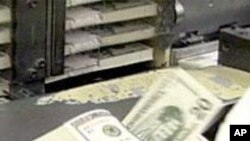Hopes for a sustained U.S. economic recovery have been boosted by a triple-dose of upbeat data on manufacturing, construction and home sales. At the same time, an American carmaker has reported strong earnings that easily beat analysts' expectations.
Days after a report saying the U.S. economy expanded at a better-than-expected 3.5-percent annual rate in the third quarter of the year, further signs of an economic rebound have emerged.
A private reading of American manufacturing showed activity in the sector growing at the fastest pace in more than three years. The Institute for Supply Management's manufacturing index rose from 52.6 in September to 55.7 last month. Readings above 50 indicate expansion of U.S. manufacturing.
At the same time, the Commerce Department reports U.S. construction spending rose .8 percent in September, a far better performance than analysts had expected. Contributing to the gain was the largest jump in residential construction since 2003.
"It is great news. Certainly the more construction spending that we see, [it] directly relates to more jobs. And that is exactly what we need in the economy. So I think that is an absolute positive," said
Florida construction company owner Don Santos.
Equally-upbeat news emerged from America's beleaguered real estate sector. The number of contracts signed to purchase existing homes rose for the eighth consecutive month in September to the highest level seen since 2006 - the height of America's pre-recession housing boom.
Home buyers are responding to the looming expiration of a federal tax credit for first-time home buyers, according National Association of Realtors spokesman Walter Maloney. "What we are seeing now is a rush of first-time home buyers trying to beat the expiration of the tax credit at the end of this month. And that is helping to drive [housing] inventory down, which will help home prices to stabilize faster," he said.
Economists say a rebound in depressed U.S. housing values would help restore American consumer confidence, a key ingredient in sustaining an economic recovery.
Meanwhile, U.S. automaker Ford reported $1 billion in net income in the third quarter, boosted by temporary government incentives for the purchase of fuel efficient vehicles. The only major American carmaker to forgo emergency government bail-out money during the past year, Ford says it expects to be "solidly profitable" by 2011.
But despite the day's upbeat economic news, reminders of financial fragility remain. Sunday, a major U.S. business lender, CIT, filed for bankruptcy.
CIT specialized in loans to small businesses, and its failure at the onset of America's holiday shopping season is a blow to retailers, according to Burt Flickinger, managing director at Strategic Resources Group. "The CIT bankruptcy is one of the worst things that can happen before the critical Christmas holiday selling season. Many retailers will be able to get much less credit, and the suppliers to the retailers much less credit [as well]," he said.
Despite clear signs of an economic recovery, U.S. unemployment remains stubbornly high at 9.8 percent. The federal government releases new jobless data Friday.




